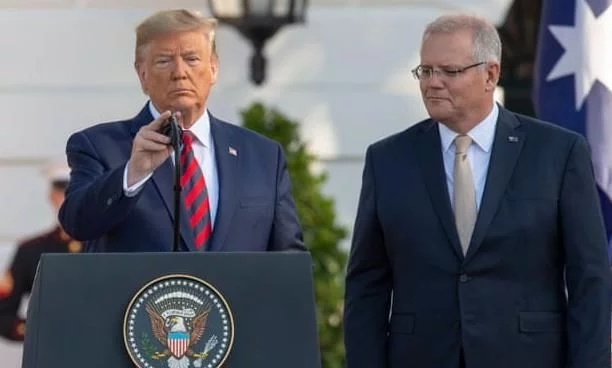
By Chen Yang
In a letter to UN Secretary-General António Guterres on July 23, the Australia's permanent mission to the United Nations rejected China's territorial and maritime claims in the South China Sea, declaring that there was "no legal basis" for China's such claims. On July 27, China's Ministry of Foreign Affairs expressed resolute opposition, saying that Australia's statement ignores the facts and violates the international law and basic norms of international relations.
From suspending its extradition treaty with China's Hong Kong Special Administrative Region on July 9 to conducting the joint exercise with the U.S. Navy and the Japan Maritime Self-Defense Force in the South China Sea on July 21, and then to opposing China's claims to the South China Sea, it seems that Australia has walked farther and farther along the road to a pawn of the U.S. in containing China.
In recent years, Australia's stance towards the South China Sea issue has shifted from "sitting on the fence" to "cautious intervention" and then to "active intervention." During the periods of the Kevin Rudd and Julia Gillard administrations, Australia showed a relatively restrained, neutral attitude towards the South China Sea issue.
After Tony Abbott took power, Australia gradually abandoned its neutral stance, and began to intervene in the South China Sea affairs as a stakeholder. Since the Malcolm Turnbull administration, Australia's South China Sea policy shifted from "cautious intervention" to "active intervention". From then on, the Australian government often implicitly or openly opposed China's claims and moves related to the South China Sea, and its attitude towards China tends to be tough.
Liu Feng, a researcher at the Institute of Maritime Silk Road of Hainan Normal University, noted that the Australian government's shift in its South China Sea policy, especially the strongly-worded statement by the Scott Morrison administration, to a large extent reflects Australia voluntarily following and collaborating with the U.S.' relevant policies and stances. Australia is a typical country outside the South China Sea region, which determines that Australia cannot make big waves no matter how hard it tries.
This time, the Morris administration disrupted peace in the South China Sea for complicated reasons.
As a country in Oceania, Australia has no right to intervene in the South China Sea affairs. Considering the massive population and great economic potential in the South China Sea region, especially the gloomy domestic economic prospect after the COVID-19 epidemic, Australia hopes to enhance its economic and trade connections with the region and highlight its presence in Asia-Pacific affairs through interfering in the South China Sea issue.
Moreover, through taking moves and making remarks that the U.S. is inconvenient to do, Australia attempts to show its "loyalty" to the U.S. and earn greater trust from the U.S.
However, Liu believes that it isn't wise for Australia to follow the pace of the U.S. in the South China Sea issue. After all, from the perspective of China-Australia economic and trade relations, Australia is heavily relied on China economically. Australia's move would only worsen its relations with China. To show itself a loyal ally of the U.S., Australia is risking its own national interests.
Australia's unlawful intervention in the South China Sea issue will not only disrupt regional peace and stability, but also make the South China Sea issue more complicated. In the past few years, the South China Sea situation generally turns towards stability and peace, indicating that countries in the region have the wisdom, ability and methods to solve disputes through peaceful consultations.
China and Australia have neither fundamental conflict in terms of national interests nor maritime disputes. For them, opportunities for cooperation and exchange overweigh the challenges they are facing. The two countries should strengthen cooperation in the field of regional security, actively expand shared interests, respect each other’s core interests and key concerns, and walk together in the same direction, so as to form a win-win strategic landscape.
Disclaimer: This article is originally published on haiwainet.cn, which is the website of Overseas Edition of the People's Daily. The article is translated from Chinese into English and edited by the China Military Online. The information, ideas or opinions appearing in this article do not necessarily reflect the views of eng.chinamil.com.cn.













